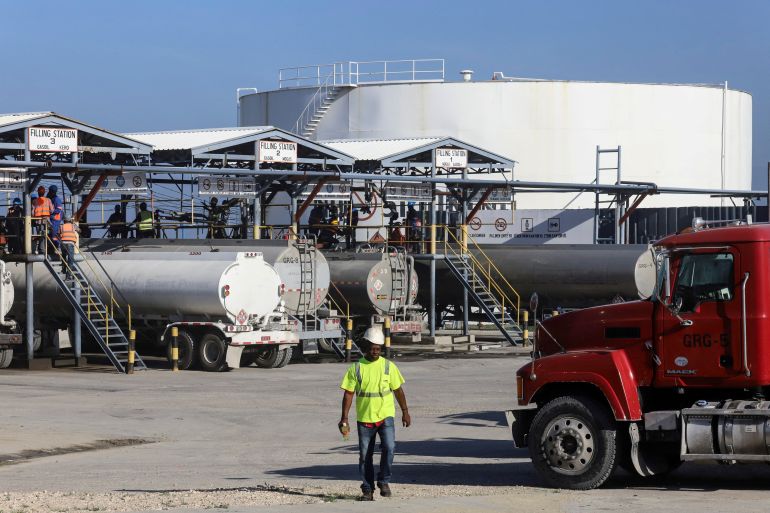UN calls for humanitarian corridor in Haiti’s crisis-hit capital
United Nations urges humanitarian corridor to allow fuel out of key, gang-blockaded terminal in Port-au-Prince.

The United Nations is calling for a humanitarian corridor to allow fuel to leave Haiti’s main terminal in Port-au-Prince, where an outbreak of cholera and surging gang violence have raised international concern.
Armed gangs have blockaded the Varreux terminal, the country’s primary fuel entry point, for weeks in anger over cuts to government subsidies, and a worsening lack of supplies has pushed health facilities to the brink of collapse.
Keep reading
list of 3 itemsHaiti’s public health crisis deepens as cholera cases reported
Haiti hospitals prepare to close as gangs blockade fuel supplies
The UN Integrated Office in Haiti (BINUH) on Thursday called “for the immediate opening of a humanitarian corridor to allow the release of fuel to meet the urgent needs of the population”.
“Access to potable water, sanitation and health care is severely disrupted, which is essential to prevent and respond quickly to cholera,” it said in a statement. “The crisis that Haiti is going through affects the population throughout the territory and the most vulnerable people are the first to suffer from the blockage.”
Local authorities and international aid groups have raised alarm after Haiti on the weekend reported its first cholera cases in more than three years.
Prime Minister Ariel Henry called for international assistance in a speech to the nation on Wednesday night. “We want them to provide all the support that is necessary to prevent people from dying,” Henry said, as reported by The Miami Herald.
An earlier cholera outbreak in 2010 linked to United Nations peacekeepers in Haiti caused approximately 10,000 deaths and more than 820,000 infections.
On Thursday, the Haitian public health and population ministry said 11 cases of cholera had been confirmed as of Wednesday evening, while two deaths also occurred at health facilities.
Another 111 suspected cases have been reported, including 27 among children aged four and under. Nearly all of the suspected cases were in and around Port-au-Prince, but two also were in Mirebalais, about 60km (37 miles) from the capital.
Cholera is an illness caused by drinking water or eating food contaminated with cholera bacteria. It can trigger severe diarrhoea, as well as vomiting, thirst and other symptoms, and can spread rapidly in areas without adequate sewage treatment and clean drinking water.
Continuing violence and the fuel blockade in Port-au-Prince have made responding to the cholera outbreak more difficult, including by preventing many residents from accessing safe drinking water and sanitation services.
UNICEF warned this week that the outbreak threatened 1.2 million children in the capital.
“Many of the poorest Haitian families, they have no option but to drink and use unsafe water … Garbage is not collected in the streets. Hospitals are closed or unable to operate,” Bruno Maes, the agency’s Haiti representative, told Al Jazeera on Wednesday.
“All these ingredients have turned Haiti into a time bomb for cholera, and now, it is exploding.”
In Thursday’s statement, BINUH said the country’s failing health centres and hospitals could put approximately 28,900 pregnant women and more than 28,000 newborns “at risk of not receiving health care” during the next three months.
“In addition, the fuel crisis could further aggravate food insecurity in the country, which would already reach 45 percent of the population according to projections made in March 2022,” it said.
The UN’s World Food Programme (WFP) warned earlier this year that worsening conditions across Haiti threatened to worsen hunger in the country, where nearly half the population is already food insecure.
“The violence is causing a serious protection crisis and making it harder for people to access and afford food,” the group said in July.